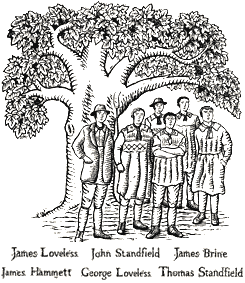The Tolpuddle Martyrs and Freedom
The Tolpuddle Martyrs and Freedom
IN THE run up to Magna Carta Day – on Wednesday 15 June – the National Liberal Party will be taking a look at the concepts of Liberty, Independence and Democracy. We’ll also be looking at the various threats to our traditional rights and freedoms.
One of the freedoms that we take for granted today is the right to join a Trade Union. Wikipedia – the free online encyclopedia – gives this reasonable definition of the aims of such a movement:
“A trade union (British English) or labor union (American English) is an organization of workers that have banded together to achieve common goals such as better working conditions. The trade union, through its leadership, bargains with the employer on behalf of union members (rank and file members) and negotiates labour contracts (collective bargaining) with employers. This may include the negotiation of wages, work rules, complaint procedures, rules governing hiring, firing and promotion of workers, benefits, workplace safety and policies. The agreements negotiated by the union leaders are binding on the rank and file members and the employer and in some cases on other non-member workers.” (1)
However, this wasn’t always the case. Years ago, ordinary working folks faced absolutely appalling working conditions – including impossibly long hours and very little pay. They really did live on the bread line.
We were recently reminded of the great fight to establish trade unions by an editorial – The Fight Goes On! – which appeared in issue 4 of British Worker, the magazine of Solidarity Trade Union.(2) It contrasted the ideals of both the early Trade Union movement and Labour Party with the actions of those who lead them today. In part it noted:
“THE ROOTS of the modern Trade Union movement can be traced back to the Tolpuddle Martyrs of 1834 and the origins of the Labour Party lie in the late 19th century. Both organisations were set up with the honourable intention of representing ordinary workers.
Tolpuddle Martyrs of 1834 and the origins of the Labour Party lie in the late 19th century. Both organisations were set up with the honourable intention of representing ordinary workers.
The Tolpuddle Martyrs – George Loveless, his brother James, James Hammett, James Brine, Thomas Standfield and Thomas’s son John – formed the Friendly Society of Agricultural Labourers. This trade union was formed to protest about their poor pay and a third wage cut in as many years. Two of the early Labour Party pioneers were Keir Hardie and Bob Blatchford. Both were patriotic socialists – indeed, it’s thought that Blatchford founded the slogan Britain for the British!
How times have changed!”
The web-site of the Tolpuddle Martyrs Museum (3) also gives an indication of the hardships endured by British workers, the fight to establish Trade Unions and their part in ensuring that employees enjoy some form of liberty and freedom:
“The Dorset countryside is beautiful but in the 1830s life in villages like Tolpuddle was hard and getting worse. Workers could not bear more cuts to their pay. Some fought back by rioting but this brought harsh punishments.
In 1834, farms workers formed a trade union. When six leaders of the union were arrested and sentenced to seven years’ transportation, a massive protest swept across the country. Thousands of people marched through London and many more organised petitions and protest meetings to demand their freedom.
Their ‘crime’ was to take an oath of solidarity in forming a trade union.
The protest campaign proved successful and they returned home in triumph.
Their story is now part of the development of a free and democratic society. It is celebrated in the small museum in Tolpuddle and at the Festival on the weekend of the third Sunday in July.”
Interestingly, whether by accident or design, the six founders of the union in Tolpuddle sometimes used to meet by a sycamore tree in the village. Fittingly, those who today continue the fight for freedom regard the tree as a universal symbol of liberty.
To read the full editorial which mentions the Tolpuddle Martyrs (as noted above), simply contact Solidarity Trade Union solidaritygb@aol.com and ask for a pdf copy of the latest issue of British Worker.
(1) http://en.wikipedia.org/wiki/Trade_union
Date: June 14, 2011
Categories: UK News
































